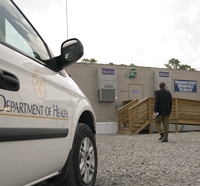Fu nd Helps Two Mississippi Counties Restore Public Health Services
nd Helps Two Mississippi Counties Restore Public Health Services
When the eye of Hurricane Katrina passed over the coastal towns of Waveland and Bay St. Louis in Hancock County on August 29, 2005, the health department building was completely submerged. Two counties over, the roof of the Pascagoula health department building in Jackson County was blown away, and the building was drenched in rain water. Now the two structures are filled with debris and sit molding, from the inside, out, along with most of the furniture, equipment, computers and patient records they housed.
Thanks to the CDC Foundation’s Emergency Preparedness and Response Fund, the health departments in Hancock and Jackson counties are now operating out of new facilities. Soon after the storm, the Foundation provided funds to purchase specially designed modular public health clinics to replace the health department buildings destroyed by Hurricane Katrina. GE manufactures these modular clinics and generously agreed to donate one of the two facilities valued at $458,200.
“In the midst of all the trauma, the assistance from the CDC Foundation fund was like a life line,” said Kathy Beam in an October 2005 interview. At that time Beam was the district administrator for Hancock and Jackson Counties and four additional coastal counties in Mississippi. She has recently retired.
On August 29, 2006, the CDC Foundation will host a building dedication and reception in Hancock County, Mississippi, to celebrate the progress made in restoring public health services to the citizens of the Gulf Coast region and the promise of safer and healthier communities as this important work continues.
Health department professionals in Mississippi provide an extensive array of services to local communities, including direct care offered on-site and immunizations to adults and children. They provide family planning and STD testing services, nutrition counseling to women with infants and young children, hearing and vision screenings, maternity services and child health exams for low income children.
In addition to direct care, local health department professionals also inspect restaurants and water wells to ensure safety of food and water, license and inspect child care facilities, conduct surveillance and control of diseases like tuberculosis and West Nile virus, organize seasonal flu shot campaigns and visit local schools to teach students about hygiene and oral health. The new modular public health facilities provide efficient and appropriate space to conduct all of these activities.
Before the modular facilities were installed, the Hancock County team temporarily worked in a mobile clinic – essentially a large van. The Pascagoula health department in Jackson County shared a small building with the health department in neighboring Ocean Springs. To provide health services to residents of Pascagoula, the Pascagoula health department also set up shop in a tent in the parking lot of their former facilities. “It’s fairly impossible to conduct a maternity exam with any degree of privacy in a big open tent,” said Beam.
Beam has been touched by the compassion and concern of the rest of the country. “The amount of support has been a beautiful thing to see,” said Beam. Many health professionals in the three Coastal counties lost everything in the storm surge. But, they have slowly returned to work and most, now, are providing much-needed public health services to those who have been able to return to their homes in coastal Mississippi.